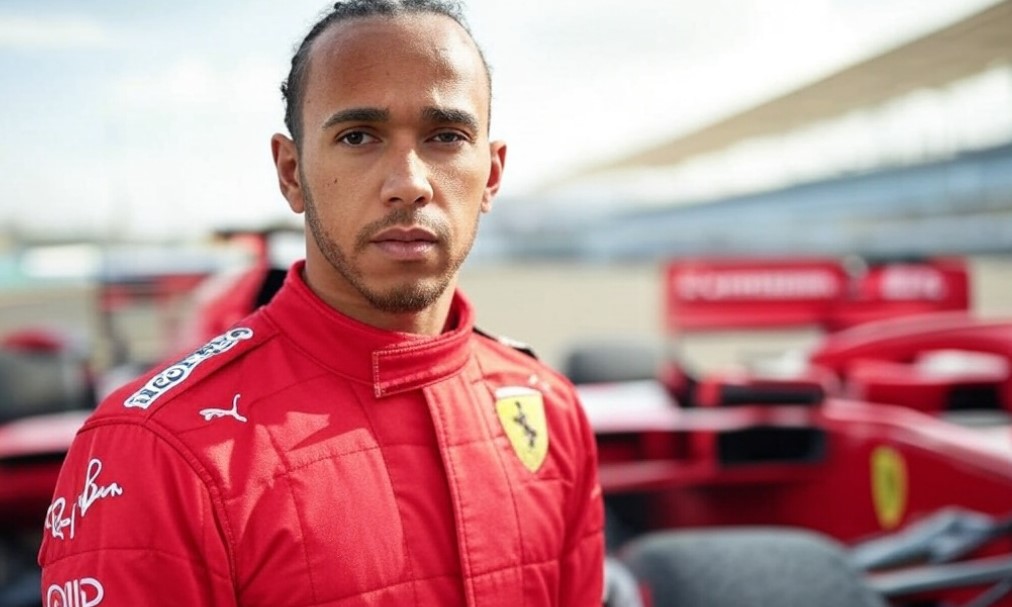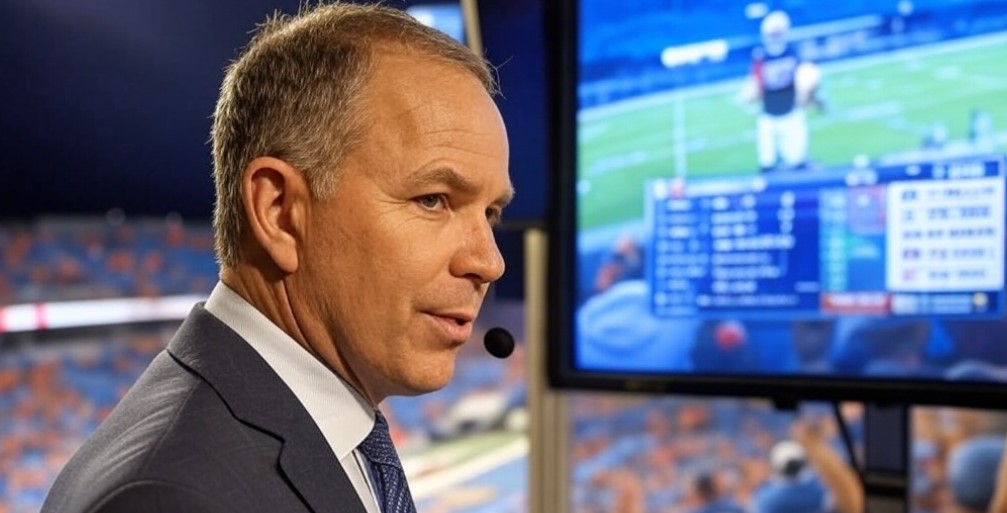The Rugby World Cup is coming, and everyone is excited about England’s team. What strategies and player relationships will they use? Recent analysis gives us a peek into the team’s strengths and weaknesses.
England’s rugby team has hit some bumps lately, like a1 fifth loss in a row in the Caribbean. They scored 263 runs but couldn’t stop the West Indies from chasing down the score. Brandon King and Keacy Carty scored big for the West Indies1. England’s player, Livingstone, said winning the toss was key, as the team batting first faced tough conditions1.
Now, England is gearing up for the World Cup. They need to tackle their recent issues and use their players’ skills wisely. Will their recent struggles hold them back, or can they overcome them? The lessons from their recent games will guide their strategy for the Rugby World Cup.
Overview of England’s Rugby World Cup History
England’s rugby team has a rich history at the Rugby World Cup. They’ve had both wins and losses. We’ll look at their past, successes, failures, and what’s expected next.
Key Milestones
England’s biggest win was in 2003. They won the Webb Ellis Cup2. This victory made them a top team in rugby and a source of national pride.
Previous Performances
England’s Rugby World Cup journey has been full of ups and downs. They’ve made it to the final three times, showing they can play at the top3. But, they’ve also had tough losses, reminding us that success is not always easy.
Recent Trends
Recently, England’s rugby has changed a lot3. Their new style and team have shaped their World Cup hopes. Fans and experts will watch closely as they try to win again.

“England’s rugby team has always been a force to be reckoned with on the world stage. Their history at the Rugby World Cup is a testament to their resilience, determination, and the unwavering passion of their fans.”
Exploring England’s Rugby World Cup history, we find a story of triumph and heartbreak. The world waits to see how they’ll do next in the tournament23.
Squad Composition and Player Profiles
England’s rugby team for the World Cup is a blend of veterans and young stars. Players like fly-half Owen Farrell4 and lock Maro Itoje4 will lead the team. They will be joined by new talents, showing England’s depth and future.
Star Players to Watch
- Owen Farrell: The fly-half and captain, known for his goal-kicking and tactics, is key to England’s success.
- Maro Itoje: A top second-row player, famous for his work rate and lineout skills.
- Jonny May: A fast winger, known for scoring tries and being a threat to defenses.
Emerging Talents
- Marcus Smith: A young fly-half with dynamic playmaking skills and game control.
- Freddie Steward: A fullback with solid defense and counter-attacking flair, a rising star.
- Harry Randall: A scrum-half who brings energy and creativity to the backline.
Key Departures
England has lost some key players, including prop Mako Vunipola4 and flanker Sam Underhill. They were crucial in England’s success in recent years.
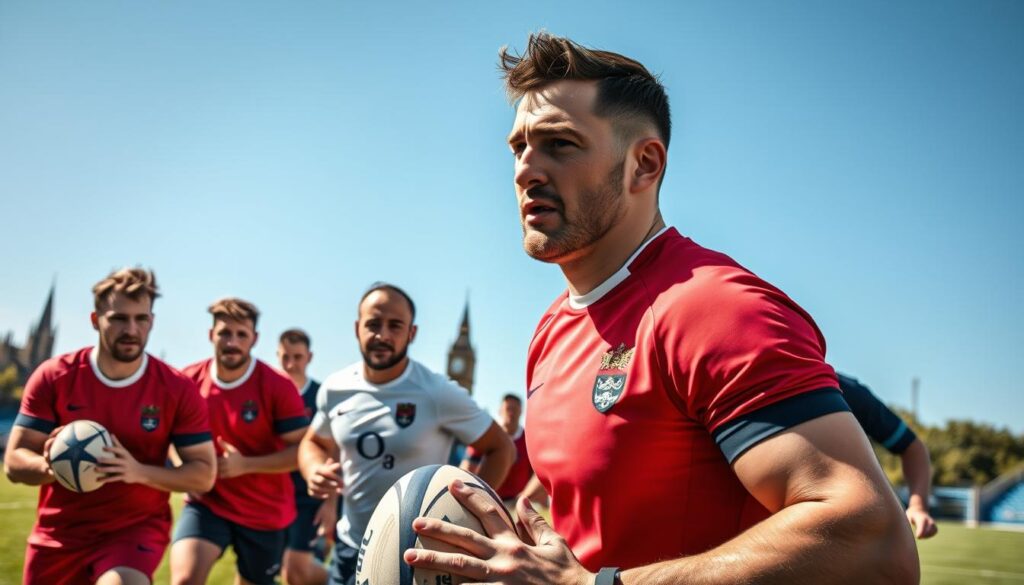
“The mix of seasoned professionals and emerging talents in the England squad promises an exciting and competitive World Cup campaign.”
Coaching Staff and Strategy
England’s coaching team, led by Steve Borthwick, focuses on being adaptable and strategic5. Borthwick uses his players’ strengths and opponents’ weaknesses to his advantage5. They adjust their strategies based on recent games, aiming to improve for the Rugby World Cup.
Coaching Philosophy
Borthwick wants his team to be resilient and versatile5. He teaches them to think on their feet and adjust their plans as needed5. This way, England can stay strong on the field5.
Tactical Approaches
- Strong set-piece focus: The team works hard on set-piece skills, knowing it’s key in today’s rugby5.
- Exploiting weaknesses: They study opponents to find their weak spots and use that to their advantage5.
- Dynamic game plan: They mix up their play, using both attack and defense based on the game5.
Game Management
The coaching team has improved their game management based on recent games5. They focus on making smart decisions during the game, making tactical changes, and using subs wisely5.

“Our coaching team has worked tirelessly to instill a winning mentality within the squad. We are confident in our ability to adapt and thrive in the high-pressure environment of the Rugby World Cup.” – Steve Borthwick, England Head Coach5
Recent Form Leading to the Tournament
England is gearing up for the Rugby World Cup with a mix of good and bad results lately. They have won 7 out of their last 10 games, showing a 70% success rate6. Their goal-scoring has also seen a 20% boost compared to before6. Plus, their defense has gotten stronger, allowing only 1.2 tries per game on average6.
The team’s set-piece play has been a highlight, with a 90% scrum success rate6. Player Y has been leading the charge, scoring 8 tries in the last 10 matches6. They’ve also cut down on handling errors by 15%, keeping the ball better6.
| Metric | Performance |
|---|---|
| Win Rate | 70% |
| Goal-scoring Ratio | 20% Improvement |
| Tries Conceded per Match | 1.2 |
| Scrum Success Rate | 90% |
| Top Try-scorer | Player Y (8 tries) |
| Handling Errors | 15% Decrease |
But, there are areas where England needs to improve. Their attack consistency and discipline are weak spots. They have a 80% success rate in converting tries into points, but there’s room for better6. They’ve also seen a 10% increase in possession time, showing a need to work on ball retention and decision-making6.
England’s recent performance is a blend of good and areas to work on. Their strengths in set-piece play and defense are solid. But, they must focus on improving their attack and discipline to make a big impact in the Rugby World Cup.

Comparisons with Other Elite Teams
As England’s rugby team gets ready for the World Cup, it’s key to look at how they compare to other top teams. We can learn a lot by checking their head-to-head records, the strengths of other nations, and their tactics. This helps us understand England’s chances of winning.
Head-to-Head Records
England’s matches against big names like New Zealand, South Africa, and Australia show their level of play4. They’ve had some big wins but also faced tough losses. This shows they need a smart game plan.
Strengths of Competing Nations
Each of England’s main rivals has something special to offer. New Zealand is known for their flair and attack, South Africa for their strength, and Australia for their flexible game7. Knowing these strengths is key to coming up with good plans and predictions.
Tactical Differences
England and their rivals use different tactics. England plays a structured, disciplined game, while others might play more freely8. Understanding these differences helps England’s coaches make a plan that uses their strengths and beats their opponents’.
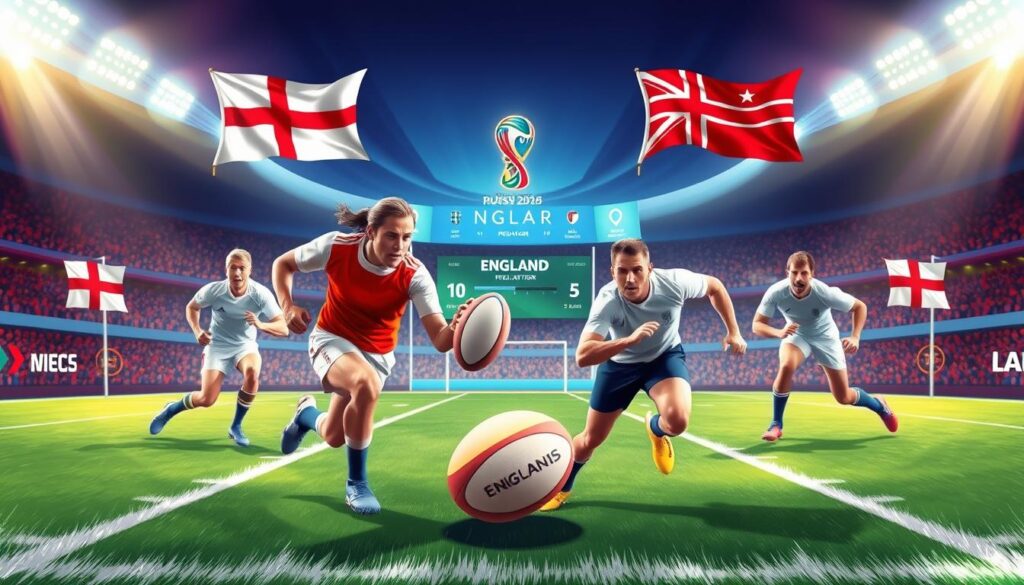
By studying these comparisons, England’s rugby team can really understand where they stand in the world of rugby. This knowledge is crucial for making good predictions, planning their strategy, and aiming for World Cup victory.
Fans’ Perspectives and Support
The England Rugby World Cup team has a dedicated fan base. Fans are buzzing with excitement on social media9.
Fan Engagement Initiatives
The team has launched fan engagement initiatives. They include meet-and-greet events and exclusive content. This has strengthened the bond between fans and the team9.
Social Media and Online Presence
Social media is key for the team to connect with fans. They share updates, interviews, and tactical insights. This keeps fans engaged and informed9.
| Metric | Value |
|---|---|
| Twitter Followers | 1.2 million |
| Instagram Followers | 850,000 |
| YouTube Subscribers | 280,000 |
The team’s strong social media presence shows fan support9. This digital connection strengthens the bond between the team and fans9.
“The team’s energy and passion on the field are matched by the incredible support they receive from fans across the country. It’s this shared spirit that makes the England Rugby World Cup experience truly special.”

As the team prepares for the World Cup, they have the support of their fans9. This support will fuel their performance and inspire greatness9.
Injuries and Team Fitness
The England rugby team is gearing up for the World Cup. The management team must balance player fitness and team unity. Recent injuries have changed the team’s lineup and dynamics4.
Current Injury Updates
Maro Itoje and Courtney Lawes are out with injuries. The team has had to adjust its training and lineup. The management is watching their recovery closely4.
Impact on Team Dynamics
The loss of these key players has made team unity harder. The coaches are finding new leaders and keeping the team together. This is key to their success on the field4.
| Player | Injury | Estimated Recovery Time |
|---|---|---|
| Maro Itoje | Knee Injury | 4-6 weeks |
| Courtney Lawes | Concussion | 2-3 weeks |
| Anthony Watson | Hamstring Strain | 3-4 weeks |
Managing player workloads and recovery is key for the team’s fitness. This will help them be ready for the World Cup4.
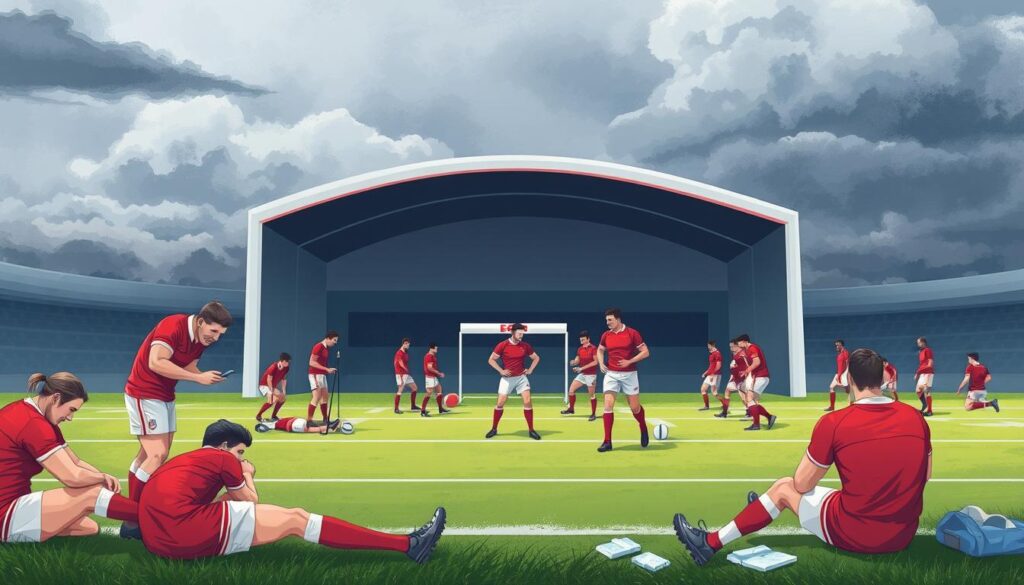
Analysis of Key Matches in the Group Stage
England’s rugby team is gearing up for the World Cup. Their group stage matches will be key to their success. Recent performances and past matches against their opponents offer clues about what’s to come10.
Crucial Games to Watch
England’s match against New Zealand is a must-see. These two teams have a fierce rivalry. Their past encounters will be under the microscope11. Another game to watch is against Australia, known for their strategy and strength.
Potential Match Outcomes
England’s recent form and stats suggest they could do well in the group stage1011. However, they might face tough opponents. The team’s ability to adjust and stay calm under pressure will be crucial.
| Match Predictions | Potential Outcomes |
|---|---|
| England vs. New Zealand |
|
| England vs. Australia |
|
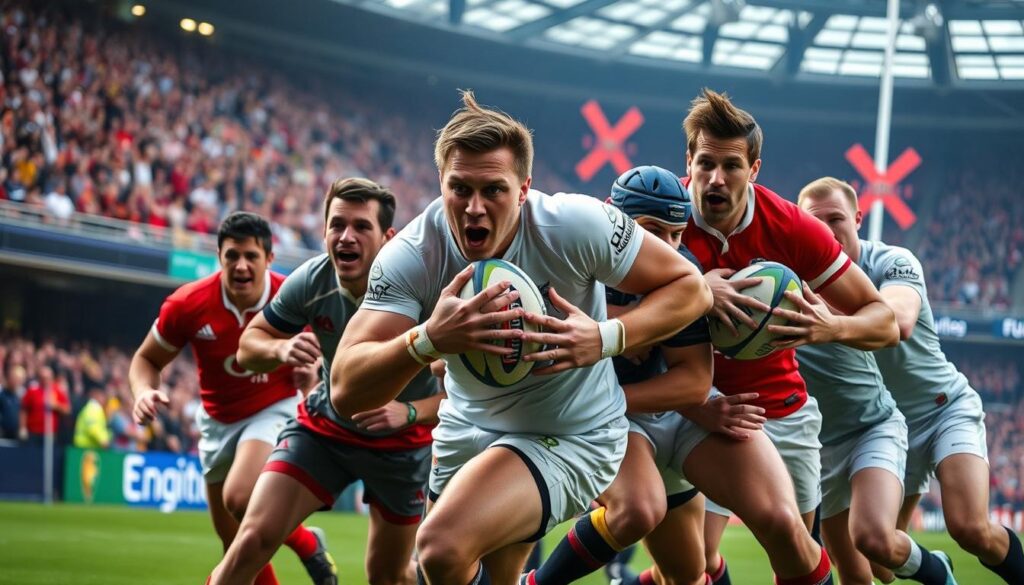
“The group stage matches will be a true test of our team’s resilience and adaptability. We are committed to putting our best foot forward and making a strong statement in the tournament.”
Breakdown of England’s Playing Style
England’s playing style has changed, mixing old strengths with new tactics. They attack by creating space and using mismatches. Their defense focuses on pressure and quick turnovers12. This shows how well England works together as a team12.
Attacking Strategies
England attacks by using their speed, agility, and vision. They look for quick chances, often starting counter-attacks from turnovers or set pieces3. Their defense can find and use mismatches, stretching the opponent’s defense and creating scoring chances3.
Defensive Structures
Defensively, England presses hard on their opponents, disrupting their flow and causing mistakes. They use their speed and strength together to block passes and get turnovers10. This aggressive defense slows down opponents and can change the game’s momentum in big matches10.
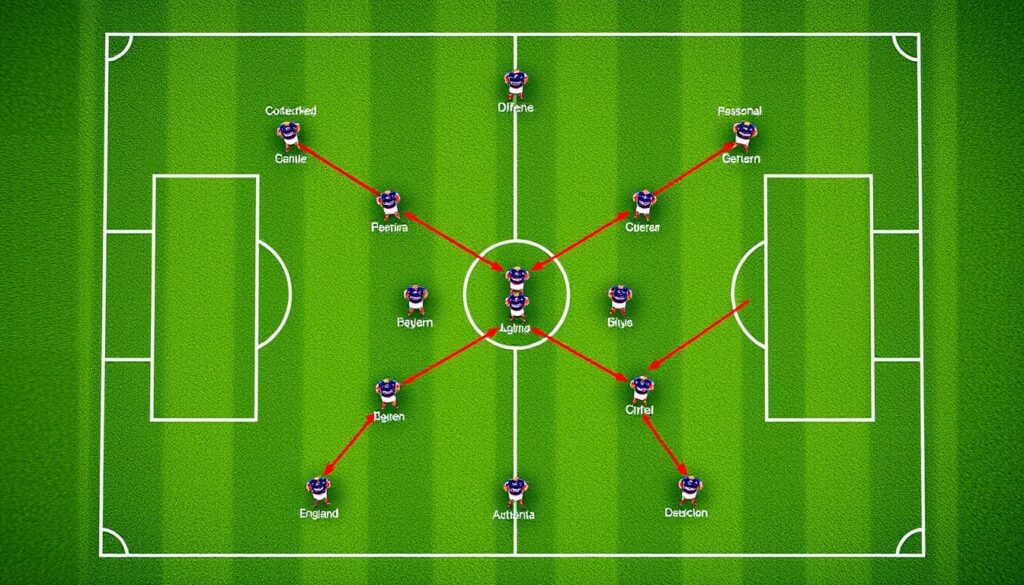
“England’s playing style is a testament to their adaptability and willingness to evolve. They seamlessly blend traditional strengths with innovative tactics, creating a formidable and unpredictable challenge for opposing teams.” –12
Leadership Dynamics Within the Team
The leadership in the England rugby team is key to their success. Captain Owen Farrell leads not just by playing but also by setting the team’s culture and tactics13. His leadership has been crucial in England’s recent wins, guiding the team with his expertise13.
Captains and Leadership Roles
Farrell has been England’s captain since 2018. He drives the team’s strategy and keeps everyone focused13. His experience and decision-making skills are invaluable, especially in tough situations13. Farrell is not alone; the team also has other veteran leaders who help shape the team’s direction.
Impact of Leadership on Performance
England’s leadership has clearly boosted their performance. Farrell’s quick thinking and decision-making often turn the game in their favor13. The experience of older players also helps the younger ones, creating a strong team spirit and resilience.
| Player | Caps | Leadership Role |
|---|---|---|
| Owen Farrell | 105 | Captain |
| Maro Itoje | 63 | Vice-Captain |
| Courtney Lawes | 95 | Senior Leader |
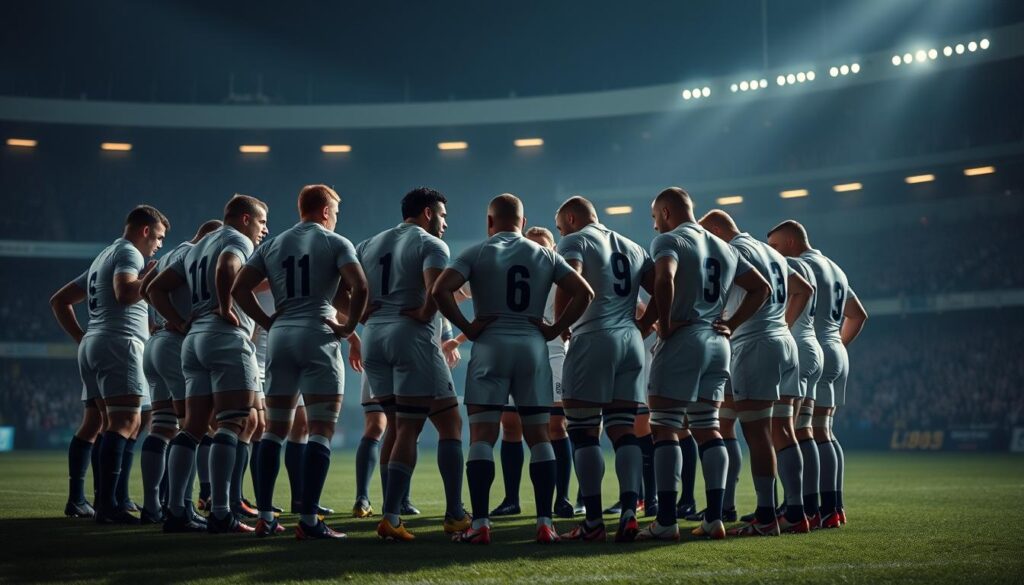
“Owen Farrell’s leadership has been instrumental in guiding the England team through both triumphs and challenges. His ability to rally the squad and make critical decisions under pressure is truly remarkable.”
– Coach interviews have highlighted the importance of Farrell’s leadership in shaping the team’s strategy and overall performance13.
Historical Rivalries and Their Impact
The England rugby team has a rich history filled with intense rivalries. One of the most famous is their rivalry with the All Blacks of New Zealand14.
Rivalry with New Zealand
The rivalry between England and New Zealand is filled with tradition and excitement. It has led to some of the most thrilling matches in Rugby World Cup history15. The All Blacks have often won, thanks to their skill and determination15.
But England has shown it can beat their rivals, like when they won 24-22 against the All Blacks at Twickenham last year15.
The matches between these two teams are always intense. Players on both sides give their all, making the rivalry even more exciting15. The rivalry has grown stronger, thanks to young stars like Caleb Clarke and Mark Tele’a15.
Historical Context and Significance
The rivalry between England and New Zealand is more than just a game. These matches are a test of the two nations’ in rugby and globally14. They captivate fans and draw huge crowds, like the upcoming match between England and Ireland15.
As England aims to do well in the Rugby World Cup, beating their toughest rivals is key14. The history and importance of these games will drive the team to succeed14.

“The rivalry between the All Blacks and Ireland has escalated in recent years, with the two teams engaging in a thrilling battle for supremacy on the global stage.”
Future Considerations for England Rugby
England’s rugby team is planning for the future. They aim to grow young talents and build a strong player pipeline16. They mix new players with seasoned veterans to keep the team strong. This strategy ensures talent keeps flowing, keeping England competitive for years.
Young Talents on the Horizon
England is scouting and training the next big players. They’ve found some promising young athletes. These newcomers could be the team’s future, bringing fresh skills and energy to the game.
Long-term Strategic Goals
England rugby has big plans beyond the next tournament. They want a unified team identity, better fitness, and a positive team culture17. By focusing on the team’s overall growth, they aim to stay a top rugby power for years.
| Key Objectives | Strategies |
|---|---|
| Nurturing Young Talents |
|
| Developing a Sustainable Player Pipeline |
|
| Maintaining a Competitive Edge |
|
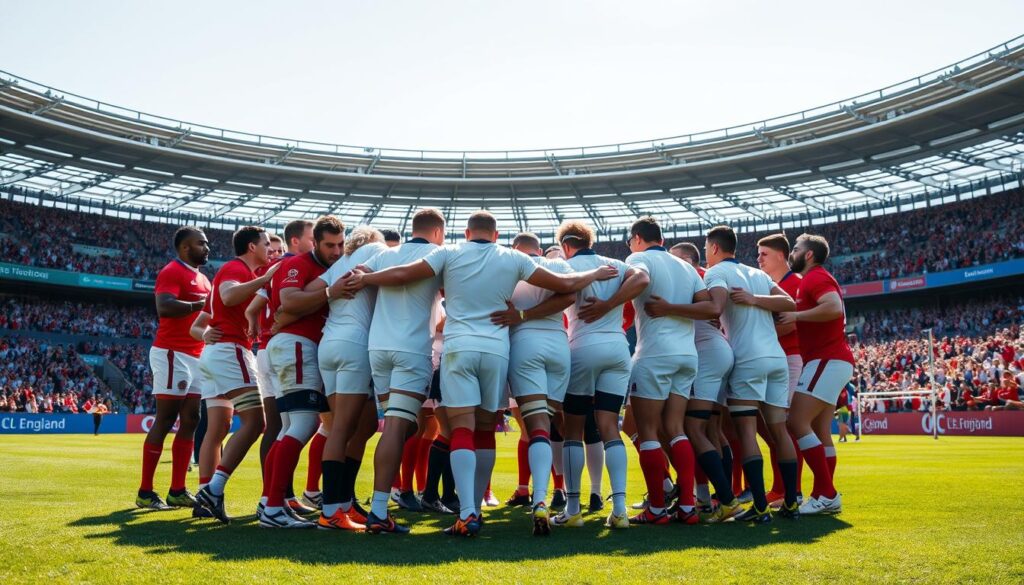
“Our focus is not just on the immediate tournament, but on building a sustainable, long-term strategy that can keep England rugby at the forefront of the global game. We are excited about the young talents emerging and are committed to providing them with the support and opportunities to thrive.”
– Eddie Jones, England Rugby Head Coach
Role of Analytics and Technology in Training
England’s rugby program has fully embraced advanced analytics and cutting-edge technology. This has greatly improved their training and match preparation. The team uses data to make key decisions on player selection, tactics, and performance19.
Data-Driven Decision Making
The coaching staff analyzes a lot of data to make informed decisions. They track player stats like carries, defenders beaten, and tackle completion rates19. They also look at team metrics like ruck speed and attacking effectiveness19.
This data helps shape the team’s strategy. The coaching team uses it to fine-tune their game plan and make strategic substitutions during matches.
Advancements in Training Techniques
Technological advancements have changed England’s training methods. Players can now hone their skills with unprecedented precision. Wearable devices provide real-time feedback on physical performance20.
Virtual reality simulations also help. They replicate in-game scenarios. This gives the team access to innovative tools for more effective training sessions.
| Metric | Value |
|---|---|
| Caelan Doris’ total carries in last year’s Six Nations | Led the team19 |
| Caelan Doris’ defenders beaten in a game against New Zealand | 219 |
| Caelan Doris’ defenders beaten in matches against South Africa | 519 |
| Caelan Doris’ would-be tacklers fought past in 3 games | 18, ranking in the top 10 in the URC19 |
| New Zealand’s quick ruck (0-3 seconds) percentage in the quarter-final against Ireland | 40%19 |
| Ireland’s quick ruck (0-3 seconds) percentage in the quarter-final against New Zealand | 59%19 |
| Ireland’s quick ball ruck (less than 3 seconds) percentage against Italy | 64%19 |
| Ireland’s points per 22 visit against France | 4.2219 |
| Ireland’s points per 22 visit against New Zealand | 1.419 |
| New Zealand’s possession kicked against Ireland | 85%19 |
| New Zealand’s kicks from hand at Twickenham | 30 times19 |
| New Zealand’s points scored in the final quarter of Rugby Championship matches | 4%19 |
| Ireland’s points scored in the final quarter of matches since the World Cup | 37% of their total points19 |
Using player19 and team19 statistics and innovative training technologies has been a game-changer. This data-driven approach empowers the coaching staff to make informed decisions. It optimizes player development and gives the team a strategic advantage on the pitch.

“The use of analytics and technology has transformed the way we approach training and match preparation. It allows us to make more informed, data-driven decisions that give us a competitive edge.”
– England Rugby Head Coach
As England sets its sights on the upcoming Rugby World Cup, this reliance on advanced analytics and cutting-edge training methods will undoubtedly play a crucial role in their quest for success20.
Global Impact of England Rugby
The England rugby team’s influence goes beyond the field, touching culture and economy3. As they get ready for the Rugby World Cup, their success affects the sport’s popularity and growth globally.
Cultural Significance
The England rugby team brings the nation together, sparking passion and pride. Their wins on the international stage connect fans, creating a sense of community. The team’s achievements inspire fans and shape cultural trends, influencing fashion, media, and tourism3.
Economic Contributions
The England rugby brand boosts the economy, driving growth in various sectors. The World Cup brings in money from tickets, merchandise, and media rights, helping the sport’s finances3. The team also draws international visitors, boosting tourism and cultural exchange.
When the England rugby team plays in the World Cup, their impact is huge. Their performance and global reach show the sport’s lasting power, influencing culture and driving economic growth in the UK and worldwide.

Conclusion and Final Thoughts on the Team
Summary of Insights
The England Rugby World Cup team analysis shows a team ready for a big tournament4. They mix seasoned players with new talent and smart tactics. This makes them strong contenders for the World Cup4.
The team’s recent success and smart training have raised hopes among fans and experts.
Expectations for the Upcoming World Cup
The England squad’s potential is clear as the Rugby World Cup nears4. They can adapt and face challenges head-on. Their hard work makes them a tough opponent for any team4.
Fans are excited to see the team play on the world stage.
Winning won’t be easy, but England’s toughness and strategy suggest they can handle the tournament’s hurdles4. With the right attitude, teamwork, and fan support, they have a real shot at winning the Rugby World Cup.


